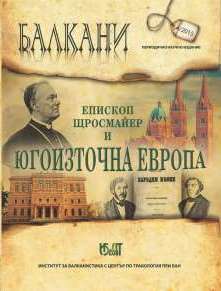Епископ Й. Ю. Щросмайер – предтеча на културния икуменизъм в Европа
The Bishop J. J. Strossmayer – Forerunner of Cultural Ecumenism in Europe
Author(s): Antoaneta BalchevaSubject(s): History
Published by: Институт за балканистика с Център по тракология - Българска академия на науките
Summary/Abstract: Almost a century and a half before the encyclical of John Paul II Ut unium sint (1994)., and a century before the Second Vatican Council of 1963, the ideas for smoothing misunderstandings and prejudices, which separate the Christian community, became a basic foundation in the cultural program of the Bishop J. J. Strossmayer, who declared as its main apostolic debt the ecumenical dialogue. The idea of the religious proximity has already evolved at the time of his studies in Budapest and his work in Vienna, where he avails of the opportunity to meet himself with the representatives of other confessions. In his platform J. J. Strossmayer combines the dialogue of Christianity, the dialogue of civilization of the Enlightenment and the cultural discourse of the second half of XIX century, which formed the ideas and identities of the Old Continent. The philosopher, theologian, politician, cultural activist, writer, patron, one of the most educated people not only of Croatia and of Europe at the time was convinced that „the old image of the two worlds, East and West“, their internecine emulation is time to bury and destroy forever along with the schism, whose reason was the said image of both worlds. According to him that is a pledge for the future of Europe. Heard from the distance of time, these prophetic thoughts of J. J. Strossmayer will resound in the postmodern aspirations for global integration, reflected in the project of Hans Küng for global ethos: „We can not survive without a global ethos. There is no world peace without religious peace. There is no religious peace without dialogue between religions.“ The Croatian dream for Europe, in which the Slavic Christian people should be united, tragically started with J. Križanić and extended by J. J. Strossmayer aims to save the creative energy of Slavic community that seems absorbed by the fluidity of the Eurasian limes. The searched rapprochement can be seen in the context of the shaped European discourses in which the peoples of Slavia romana and Slavia orthodoxa are forced to seek cultural and political compensation against the formed division, navigating between the need for a modern self-identification and a common view of the geopolitical realities. Actually the mission of the bishop of Đakovo for ecclesiastical and cultural unity is embedded in the overall concept for Europe, representing a project for the reorganization of the important geographical space extending between Eastern and Western Europe. Understood in this sense the Illyrism whose successor is Strossmayer and his cultural ecumenism emerging as a landmark structure in the formation and modification of the complex processes of the inter-discursive European exchange. ...
Journal: БАЛКАНИ
- Issue Year: 4/2015
- Issue No: 4
- Page Range: 35-41
- Page Count: 7
- Content File-PDF

